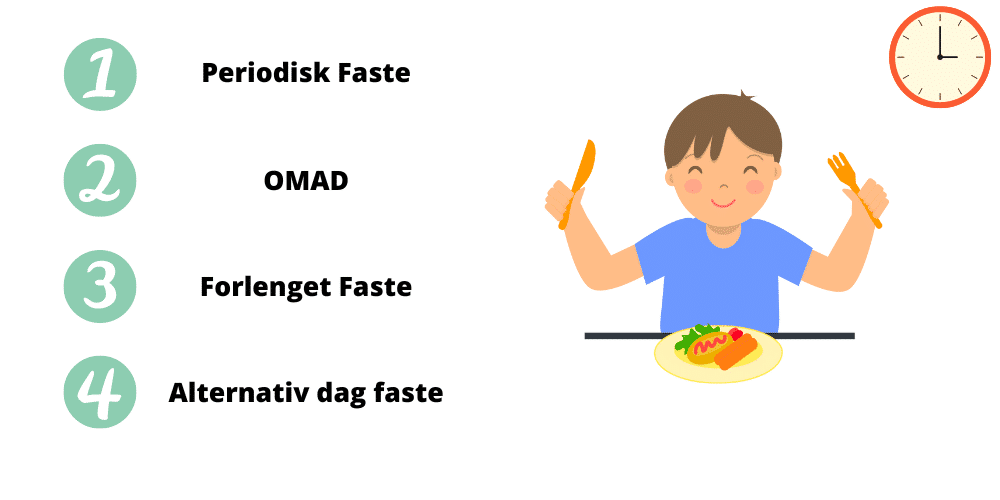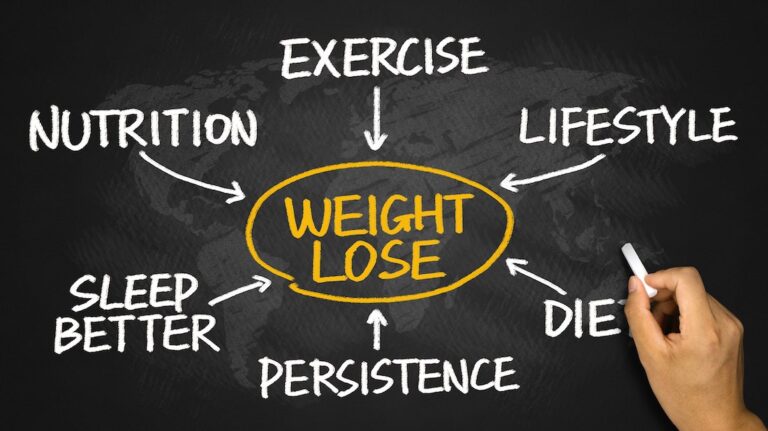Evidence suggests that intermittent fasting has a number of health benefits. Firstly, it can help with weight loss, improve brain function, increase longevity and reduce the risk of diseases. Fasting can also help to give you more energy and focus.
1. What is intermittent fasting?
Intermittent fasting is a popular lifestyle where the aim is to naturally control calorie intake and improve health by limiting the time you spend eating food. Practitioners fast for a set period of time and eat normally the rest of the time. The fasting period can be anything from a couple of hours to 48 hours, or a day or two a week where you eat a reducing number of calories or nothing.
Intermittent fasting can regulate blood sugar levels and insulin resistance in a simple and natural way. It also reduces inflammation and oxidative stress in the body, which can be beneficial in preventing diseases.
Due to its simple and flexible form, intermittent fasting can be adapted to each individual’s lifestyle and needs as the time spent planning a varied diet is reduced. It can help you become more aware of your food choices and promote a more healthy diet.
In a world where we often experience stress and imbalance in our everyday lives, intermittent fasting can be a useful technique for achieving a better lifestyle. So if you’re looking for an easy way to improve your health, intermittent fasting could be worth a try.
Did you know that intermittent fasting works best with a ketogenic diet?
- Intermittent fasting is a way of eating where you fast for certain periods of time and eat normally the rest of the time.
- Intermittent fasting is normally for up to 48 hours, or only eating a reduced number or no calories a day or two a week.
- It has been shown to help with weight loss, improve cognitive abilities, increase longevity and reduce the risk of many diseases.
- Intermittent fasting can also help you become more focused and energized.
- It’s a simple and natural way to regulate blood sugar levels and insulin resistance.
- It can also help reduce inflammation and oxidative stress in the body.
- Intermittent fasting is for many an easy way to control calorie intake and boost metabolic processes in the body.
- It can help you become more aware of your food choices and promote a more healthy diet.
- It is a flexible and customizable practice that can be adapted to each person’s lifestyle and needs.
2. benefits of intermittent fasting
Intermittent fasting has become an increasingly popular nutritional practice in recent years, and not without reason. This simple and flexible concept has been proven to have a number of health benefits and can provide quick results. Let’s take a closer look at some of them.
Weight loss
Fasting can help you lose excess weight in an effective way. When you fast, your body takes a break from digesting food and can instead use energy to burn fat.
When you fast, your body focuses on burning fat reserves instead. Studies have shown that intermittent fasting can help you lose excess weight effectively. Fasting causes your body to enter a state called ketosis, where it uses fat as an energy source instead of glucose. This way, your body can burn fat reserves, which can result in weight loss.
It is important to note that intermittent fasting is not necessarily a miracle cure for weight loss, and that it is important to follow a healthy and balanced diet as well. However, by combining intermittent fasting with a healthy lifestyle, you can experience an increased efficiency in weight loss.
So, if you’re looking to lose some excess weight, intermittent fasting may be worth a try. However, as with any change in nutritional habits, you should always talk to a doctor or nutritionist before you begin.
More energy and focus
Intermittent fasting and the production of ketones has a direct impact on the brain and its function. When we fast, the body shifts from using glucose as its main energy source to using ketones. Ketones are an alternative and beneficial energy source for the brain, and using ketones can lead to increased mental clarity, increased focus and improved memory.
Evidence suggests that fasting can also lead to an increase in the growth of new nerve cells in the brain, which can improve cognitive function over time. In addition, it can reduce inflammation in the brain, which is linked to a number of neurological disorders, including Alzheimer’s disease. Again, it is important to point out that most of this is fairly new and cannot be said with great certainty.
At the same time, ketones can have a positive effect on energy levels in the brain by increasing the production of ATP, an important form of energy. This can lead to increased concentration, attention and mental capacity.
All in all, studies show that intermittent fasting in combination with the production of ketones can have a positive impact on cognitive ability and help improve memory, concentration and mental clarity.
Improved cogency

Yes, there are actually a number of studies that have shown that intermittent fasting can have a positive impact on brain function.
Fasting leads to an increase in the levels of growth factors and nerve proteins in the brain, which can help protect and improve brain function. Fasting can also help increase concentration and attention, as well as improve memory and cognitive function.
Research shows that intermittent fasting can help increase the brain’s ability to adapt and learn, as well as promote increased concentration and attention. This can make it easier for you to concentrate on tasks and achieve your goals such as following a diet plan.
It’s important to note that nutrition plays an important role in brain health, so it’s important to follow a healthy and balanced diet too. However, by combining intermittent fasting with a healthy lifestyle, you can experience an increased efficiency in brain function.
So, if you’re looking to improve your memory, concentration and attention, intermittent fasting could be worth a try. However, as with any change in nutritional habits, you should always talk to a doctor or nutritionist before you begin.
Increased lifespan and reduced risk of disease
Intermittent fasting has been the subject of a number of studies showing that it can have a positive effect on health and longevity. Fasting regulates the level of many hormones and insulin in the body is normally reduced, which can have an anti-aging effect. In addition, fasting can help reduce inflammation in the body, which is an important factor in the development of many diseases.
Regulate blood sugar and insulin resistance
By regulating blood sugar levels and insulin resistance, intermittent fasting can also help reduce the risk of type 2 diabetes. Studies have also shown that fasting can help reduce the risk of heart disease by increasing levels of ‘good’ cholesterol and reducing levels of ‘bad’ cholesterol.
Reduced risk of cancer
Fasting has also been shown to be an effective method of reducing the risk of cancer. When you fast, your body can enter a state called auWhat is autophagy? It can be good for the body to not eat!tophagia, where it begins to fight and remove damaged cells. This can help reduce the risk of cancer and other diseases, as well as reduce inflammation in the body.
Overall, intermittent fasting has been shown to have a number of health benefits, including increased longevity and reduced risk of disease. It is important to note that although intermittent fasting has been practiced for thousands of years, there is still little research to confirm its benefits with certainty. Always consult a doctor before making major lifestyle changes.

Simpler structure to a healthy diet
Fasting can help you become more aware of your food choices and promote a more healthy diet.
Simple and natural: Fasting is a simple and natural way to regulate calorie intake and improve health.Intermittent fasting can make following a healthy diet plan easier in several ways.
-Firstly, it reduces the time and planning required to prepare meals. Instead of having to think about what to eat for each meal, you just need to plan your periods of fasting and make sure you eat nutritious, balanced meals the rest of the time. This can make it easier to follow a healthy diet and reduce the chance that you will fall back into unhealthy eating habits.
In addition, intermittent fasting can help reduce hunger and the feeling of being hungry, which can make it easier to resist temptation and stick to a healthy eating plan.
So, if you want to improve your health in a simple and effective way, consider trying intermittent fasting. It’s worth noting that it’s always best to talk to a doctor before beginning a new nutritional practice.
3. Types of intermittent fasting
These are just some of the many variations of intermittent fasting, and it’s important to choose the one that best suits your lifestyle and individual needs. It is important to always seek advice from a doctor before starting a new nutritional practice.
- Periodic fasting
- OMAD
- Extended fasting
- Alternative day fasting

Periodic Fasting
Intermittent fasting means choosing a specific period of time to fast, and then eating as usual during another period. For example, you could fast for 16 to 20 hours and eat for the remaining 8 to 4 hours. This gives the body a break from digestion and the opportunity to focus on other processes, such as fat burning. This is the most popular type of fasting and the one we have relied on the most in this article.
OMAD (One meal a day)
OMAD, or “One Meal a Day,” is a form of alternative day fasting that has become more popular lately. The concept is simple: You eat just one large meal per day, and fast for the remaining 23 hours.
As with other forms of intermittent fasting, OMAD has been shown to have a number of health benefits. For example, it can help with weight loss, improve brain function, increase longevity and reduce the risk of diseases. It can also help reduce inflammation and oxidative stress in the body.
One of the biggest benefits of OMAD is that it makes it easy to control your calorie intake. When you eat just one large meal per day, you are less likely to overeat or eat unhealthy foods. At the same time, when you fast the rest of the time, your body will start burning fat instead of carbohydrates, which can help with weight loss.
It’s important to note that OMAD is not for everyone, especially for people with specific health problems such as diabetes or for those who already have low blood sugar. Before trying OMAD, you should always talk to a doctor or nutritionist to make sure it’s safe for you.
It’s also important to make sure you’re getting adequate nutrition and nutrients through the one big meal you eat. You should try to include a mix of proteins, complex and small carbohydrates and healthy fats in your meal to maintain a balanced diet. Check out our protein calculator to see how much protein you need every day.
I’ve been eating OMAD for up to six months straight, it’s the diet I’ve felt best on. Stress-free with a balanced stomach and gut. The combination of active training and weightlifting means that I have to alternate between eating omads and then periodically expanding the eating gap to maintain enough calories to keep the weight off.”
Ronny Bruknapp, Founder New Baseline
Extended Fasting
Extended fasting, also known as prolonged fasting, involves fasting for a longer period than in regular intermittent fasting. This can be for a minimum of 24 hours or even several days or weeks. The goal of prolonged fasting is to give the body an increased opportunity to do a deep clean and burn fat reserves.
Research has shown that prolonged fasting can have a number of health benefits, including weight loss, increased mental clarity and focus, as well as reduction in inflammation and oxidative stress in the body. This can also help increase longevity and reduce the risk of diseases such as heart disease, cancer and diabetes.
It is important to note that prolonged fasting is not suitable for everyone, especially pregnant or breastfeeding women, people with low blood sugar or people with eating disorders. It’s also important to consult your doctor before starting an extended fasting routine to make sure it’s safe for you. Extended fasting is not right for everyone!
Extended fasting requires some discipline and motivation, but for many, it can be an effective way to improve health and achieve their goals of weight loss and increased wellbeing. If you want to try extended fasting, it’s important to plan and prepare for a healthy and balanced diet when you end your fast.
Alternative Day Fasting
Alternate Day Fasting is a form of intermittent fasting where you fast one day and eat as normal the next. This can be repeated as a fasting day and a non-fasting day in a cyclical pattern.
Alternate day fasting is an easy way to implement fasting into your everyday life, as you only need to fast one day a week. It also gives you the freedom to choose when you want to fast, so you can adapt it to your lifestyle and needs.
It is important to note that alternate day fasting is not suitable for everyone, especially pregnant women and people with medical conditions. It is always recommended to consult with a doctor before starting a new nutritional practice.
4. Who should not fast?
Most people can safely and successfully incorporate fasting into their daily lives with few, if any, side effects. However, there are some specific individuals who should avoid fasting, or at least do so under the close supervision of an experienced clinician.
- Most people can safely and successfully incorporate fasting into their daily lives with few, if any, side effects. However, there are some specific individuals who should avoid fasting, or at least do so under the close supervision of experienced personnel.
- Women who are trying to conceive may find that fasting disrupts their menstrual cycle and reduces their fertility. At the same time, there is some uncertainty about reproductive hormone production according to this study. However, women with infertility from PCOS may find joy with a low-carb diet and possibly with time-restricted eating. This should be monitored by an experienced clinician.
- Children have higher energy requirements due to their rapid growth rates. Fasting is generally not appropriate or safe.
- Anyone who is underweight or malnourished should also avoid fasting.
- Anyone with a history of eating disorders, such as anorexia or bulimia, should avoid fasting, as it can trigger eating disorder tendencies. A history of anorexia or bulimia can also alter the perception of being underweight or malnourished, potentially putting the individual at risk when fasting.
- Anyone taking medications that lower blood sugar – such as insulin, sulfonylureas and others – should only fast under the supervision of an experienced clinician.
5. How to get started with intermittent fasting
If you want to start intermittent fasting, there are some things you should know before you start. Here are some tips for getting started with a standard intermittent fasting versus a 20:4 diet.
Before you start, you need to set clear goals. Set up something that suits you and your everyday life. But here is a general guide on how to adapt the body to intermittent fasting with step-by-step habituation.
- Cut down on carbohydrates for two weeks and a balanced diet. Try to look towards a healthier balanced diet. Sign up for our newsletter at the bottom of the page to receive a 12-day plan. This section is not required, but will make the transition much easier.
- Week 1 – Start small. Cut out eating in the evening after 20:00. The first week, postpone breakfast until 09:00. Now you already have a 13-hour gap.
- **Week 2 -16:8. **Move the eating hatch gradually, aiming to be on a 16-day fasting period in week two. Already now, you will normally notice benefits. Remember, if you feel sick or unwell, it’s better to eat and try again the next day.
- **Week 3 – 18:6. **Eat lunch at 12:00 and dinner at 18:00. Now you have 18 hours of fasting every day.
- Week 4 and beyond. Now you have a new lifestyle and it will be easier for you with a balanced everyday life. Try out what works for you. For some, OMAD (One meal a day) is best. For others, a longer eating window is better.

Purpose
Determine the purpose of fasting: Before you begin intermittent fasting, it’s important to decide what you want to achieve. Want to lose weight, improve concentration or reduce the risk of disease? Having a purpose can help you stay motivated while increasing the likelihood of you following through.
Strategy
Choose your fasting plan: There are many different types of intermittent fasting, such as alternate day fasting, the 16:8 method and OMAD. Choose a plan that suits your lifestyle and routine. It’s not uncommon to change practices along the way. What works for you may not necessarily work for your neighbor. If you are pregnant or have health problems, consult your doctor before making any major lifestyle changes.
Be prepared to adapt
Be prepared to adapt: At first, adjusting to Lent can be challenging. But with time, you will become more accustomed to it and experience fewer negative side effects.
What’s important is that you eat if you feel unwell. Just try again tomorrow. There is a big difference between how damaged your metabolism is compared to others. While some people only need a few days, you may need several weeks before your body is able to use fat as energy in the form of ketones.
Drink enough water
Stay hydrated: It’s important to drink enough water while fasting, as it can help reduce hunger and headaches.
At the same time, there is a lot of water in the food you eat. When you might not eat for 20 hours, it’s important that you drink enough water. Remember coffee is not hydrating to a great extent. That’s why it’s important to make sure you drink enough water. Sugar-free drinks are allowed. But for optimal effect from fasting, it is important that you drink enough water.
Many people prefer to use coffee or tea during the fasting period to cover up their hunger. Some people add MCT oil and butter to coffee or tea.
Eat the right amount and enough salt
Even if you’re fasting, it’s important not to overeat when you eat. Try to eat healthy and balanced when you’re not fasting. At the same time, it’s important to make sure you get enough minerals such as salt, magnesium and potassium. Don’t be afraid to salt your food well. Especially in the beginning when the body excretes a lot of water.
Benefits of a low-carb diet
A low-carb diet focuses on reducing the intake of carbohydrates and increasing the intake of fat and protein. This can cause the body to switch to using fat as its primary energy source, which can lead to weight loss. At the same time, a low-carb diet can help regulate blood sugar levels and insulin resistance, which can be helpful in preventing or controlling a number of diseases, including diabetes.
Intermittent fasting, on the other hand, involves fasting for a set period of time and eating normally the rest of the time. This can help regulate calorie intake and boost metabolic processes in the body, which in turn can contribute to weight loss.
The combination of a low-carb diet and intermittent fasting can therefore help boost weight loss and improve health by reducing calorie intake while ensuring that the body has sufficient nutrients to function optimally.

Be patient
It takes time to see results from intermittent fasting. Be patient and don’t give up if you don’t see results immediately. It is very individual how quickly the body adapts.
No miracle cure
Just remember that intermittent fasting is not a miracle cure and that it is important to combine it with a healthy lifestyle and a balanced diet. If you have any questions or concerns, you should always seek advice from a doctor or nutritionist before you start or along the way.
6. Tips for success with intermittent fasting
- Start gradually: Start with a simpler form of intermittent fasting, such as alternate day fasting or 16-hour fasting, and gradually increase as you feel comfortable.
- Plan your meals: Plan your meals to avoid unnecessary hunger and make sure you get enough nutrients.
- Drink enough water: Drink enough water while fasting to reduce hunger and headaches. Add a little lemon juice and a pinch of salt to the water to get rid of hunger.
- Use coffee and tea during the fasting period when you would normally eat.
- Avoid junk food: Avoid poorly processed food and make sure you eat a healthy and balanced diet when you’re not fasting.
- Eat enough calories: Make sure you eat enough calories when you’re not fasting to ensure you have the energy to complete your daily activities.
- Be physically active: Be physically active and keep moving, as it can help boost your metabolism and make you metabolically flexible faster. At the same time, you will normally trigger autophagy with exercise.
- Stick to set times: Try to stick to a fixed schedule to make it easier to follow your program.
- Don’t stress: Don’t stress about fasting, and remember that having a healthy lifestyle is more important than following a fasting program exactly to the clock every day.Be patient: Be patient with yourself and don’t expect overnight results. Changing your lifestyle takes time, so be patient and keep working towards your goals. If you eat during the fasting week one day, just start again the next day.
7. What to eat on intermittent fasting
It depends somewhat on which form of intermittent fasting you follow. In general, it is recommended to eat a healthy and balanced diet with a focus on proteins, fiber-rich vegetables and healthy fats in your diet.
Remember to salt your food well as the body excretes a lot of minerals in the process. Especially if you also follow a low-carb diet.
It will also depend on your individual goals, lifestyle and health status. For example, if you’re following a low-carb diet, you’ll likely place a greater emphasis on eating proteins and fats, while avoiding high-carbohydrate foods.
On the other hand, if you’re following a diet to lose weight, you may want to put more emphasis on eating lean proteins and fiber-rich vegetables. The most important thing is to follow a balanced diet that gives you enough nutrition to keep you healthy and fit.
8. What to avoid during intermittent fasting
During intermittent fasting, you should avoid eating high-carb, high-calorie foods such as sweets, soft drinks, cakes, white sugar and white flour and refined products. You should also avoid high-fat foods in large quantities if weight loss is your goal.
It is also important to avoid overeating, as overeating can destroy the positive effects of intermittent fasting. To succeed with intermittent fasting, you should focus on eating healthy, nutritious foods such as vegetables, proteins and low-carb sources.
9. How much weight loss with intermittent fasting
It is highly individual how much weight can be lost by practicing intermittent fasting. Factors such as your starting point, diet, physical activity and lifestyle will play a role. In general, you will often see a weight loss in the first few weeks, but this may vary as described here.
It’s important to remember that intermittent fasting is not a “quick fix” solution, but a lifestyle change that requires dedication and discipline to achieve the best possible results.
10. How you can adapt intermittent fasting to your lifestyle
It’s important to adapt intermittent fasting to your lifestyle to ensure that it becomes part of your daily routine and that you get the maximum benefit from it. Here are some tips for adapting intermittent fasting to your lifestyle:
- Plan your eating times: Plan when you want to eat at the dining hatch so you don’t go hungry and have enough energy to complete the day’s tasks.
- Customize the length of your fast: Choose a fasting period that suits you, whether it’s 16 or 20 hours. Adjust the length if you need more energy to complete the day’s activities.
- Be prepared: Prepare your food before the eating hatch, or have a list of healthy options available if you’re on the go.
- Avoid unnecessary temptations: Avoid sugary and unhealthy foods that may tempt you during fasting.
- Be patient: It takes time to adjust to intermittent fasting, so be patient and persevere and it will become a natural part of your everyday life.
Remember that intermittent fasting is a personal journey and it’s important to find an approach that works best for you and your lifestyle. Try different approaches and adjust them as needed to maximize the benefits of intermittent fasting and improve your health while increasing weight loss.
Ronny Bruknapp, New Baseline, 2023
11. How often should you do intermittent fasting
It depends on your individual needs and goals. Some people do intermittent fasting daily, while others only do it once or twice a week. It is recommended to start with a moderate approach and increase the frequency as your body gets used to it. It is also important to listen to your body’s signals and adapt your fasting accordingly
It can also be a good idea to vary as the body has different effects of slightly longer fasting and a daily 16:8 diet, for example. There are many examples of people who have lived well on the OMAD diet for a long time. Find what works for you and adjust as needed. Listen to your body.
12. Should you combine intermittent fasting with exercise
Many people prefer to exercise while fasting. At first, it can be somewhat uncomfortable as the body is not quite used to using ketones as energy yet. To help you decide whether to work out in the dining room, you may want to look at MCT Oil.
- Drink enough fluids
- Feel free to have coffee or another drink with MCT oil before training
- Ensure enough recovery
- Will be tough at first
- Studies show that fasting can increase the natural testosterone in the body.
13. Possible side effects of intermittent fasting
Intermittent fasting can have some possible side effects, although it is generally considered safe for most healthy adults. Some of the most common side effects include:
- Headaches and dizziness: Fasting can cause dehydration, which can lead to headaches and dizziness.
- Fatigue and low energy levels: Fasting can also lead to low energy levels and fatigue, especially at the beginning of the fasting period. Normally, you will eventually have a higher energy level than before you started fasting.
- Hunger: Hunger is one of the most common side effects of intermittent fasting. It can be difficult to stick to the fasting schedule when you’re hungry. If you feel dizzy and lightheaded, eat and start again the next day.
- Sleep problems: Fasting can also cause sleep problems for some people, as your body tries to adapt to the changes in eating habits.
- Muscle wasting: If you don’t get enough nutrients and calories throughout your eating period, it can lead to muscle wasting over time. Most people have huge reserves of calories in the form of fat on their bodies. However, losing weight too quickly is never recommended, and for long-term fasting it is important to be aware of muscle wasting.
14. How intermittent fasting affects the brain
Intermittent fasting can have a huge impact on the brain and our mental health. Fasting can lead to an increase in concentration and attention, as well as improve memory and cognitive function.
When we fast, you give your body a break from digesting food, which gives you more energy to focus on other tasks. Fasting can also help increase the production of chemicals in the brain called neurotransmitters, which can help boost your attention, concentration and memory.
In addition, intermittent fasting can help increase the production of growth factors in the brain, which are important for maintaining healthy brain health and preventing age-related brain damage. Fasting can also lead to an increase in the production of mitochondria, which are the smallest powerhouses in each cell and play an important role in maintaining good brain health.
It is important to note that the benefits of intermittent fasting for the brain have not been proven through human clinical trials, but animal studies have shown promising results.
All in all, intermittent fasting can be a simple and effective way to improve our capacity, but it is important to investigate it further before the benefits can be said with certainty as most of the research has been conducted on animals.
15. How intermittent fasting affects the hormonal system
Intermittent fasting can affect the hormonal system in several ways, both positively and negatively. The hormones that are affected by fasting include insulin, glucagon, adrenaline, noradrenaline, growth hormone and testosterone.
Insulin is a hormone that helps regulate blood sugar levels, and during fasting, insulin levels can decrease, resulting in increased fat burning. Glucagon is another hormone that increases when we fast, and it helps release energy from our fat cells.
Adrenaline and noradrenaline also increase during fasting, and these hormones help increase heart rate, improve concentration and increase fat burning. Growth hormone is also produced in greater quantities during fasting, and this hormone helps regenerate our cells and increase muscle growth.
Testosterone levels can also be affected by fasting, but this varies from person to person and depends on many factors.
It is important to note that the changes in the hormonal system that occur during fasting can vary from person to person.
16. FAQ – Frequently Asked Questions
17. Summarizing
Intermittent fasting is a type of diet where you deliberately reduce your food intake over a set period of time. There are different types of intermittent fasting, including fasting for a specific period, such as 16-20 hours, and then eating for another period, such as 8-4 hours, as well as alternate day fasting and one day at a time (OMAD).
Intermittent fasting can have many health benefits, including weight loss and an improvement in quality of life. To succeed with intermittent fasting, it is recommended that you stay hydrated, make healthy food choices and adapt your diet to your own lifestyle. However, it is important to note that there are certain groups of people, including pregnant, breastfeeding, children, underweight or malnourished, who have a history of eating disorders or are taking medication for low blood sugar, who should avoid fasting or do so under the supervision of an experienced clinician or doctor.
It is important to note that there are possible side effects of intermittent fasting, including hunger, headaches, disrupted menstrual cycle and low blood sugar. The impact of intermittent fasting on the brain and hormonal system is also an area that needs more research. As with all dietary changes, one should first consult a healthcare professional to ensure that intermittent fasting is safe and appropriate for one’s health condition.






